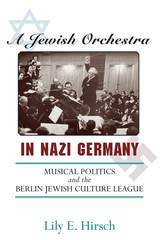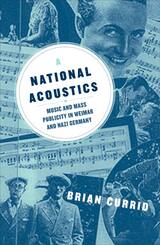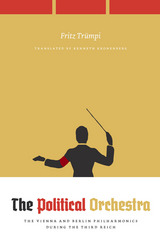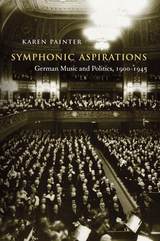
"Offers a clear introduction to a fascinating, yet little known, phenomenon in Nazi Germany, whose very existence will be a surprise to the general public and to historians. Easily blending general history with musicology, the book provides provocative yet compelling analysis of complex issues."
---Michael Meyer, author of The Politics of Music in the Third Reich
"Hirsch poses complex questions about Jewish identity and Jewish music, and she situates these against a political background vexed by the impossibility of truly viable responses to such questions. Her thorough archival research is complemented by her extensive use of interviews, which gives voice to those swept up in the Holocaust. A Jewish Orchestra in Nazi Germany is a book filled with the stories of real lives, a collective biography in modern music history that must no longer remain in silence."
---Philip V. Bohlman, author of Jewish Music and Modernity
"An engaging and downright gripping history. The project is original, the research is outstanding, and the presentation lucid."
---Karen Painter, author of Symphonic Aspirations: German Music and Politics, 1900-1945
The Jewish Culture League was created in Berlin in June 1933, the only organization in Nazi Germany in which Jews were not only allowed but encouraged to participate in music, both as performers and as audience members. Lily E. Hirsch's A Jewish Orchestra in Nazi Germany is the first book to seriously investigate and parse the complicated questions the existence of this unique organization raised, such as why the Nazis would promote Jewish music when, in the rest of Germany, it was banned. The government's insistence that the League perform only Jewish music also presented the organization's leaders and membership with perplexing conundrums: what exactly is Jewish music? Who qualifies as a Jewish composer? And, if it is true that the Nazis conceived of the League as a propaganda tool, did Jewish participation in its activities amount to collaboration?
Lily E. Hirsch is Assistant Professor of Music at Cleveland State University.

Offering a nuanced analysis of how publicity was constructed through radio programming, print media, popular song, and film, Currid examines how German citizens developed an emotional investment in the nation and other forms of collectivity that were tied to the sonic experience. Reading in detail popular genres of music—the Schlager (or “hit”), so-called gypsy music, and jazz—he offers a complex view of how they played a part in the creation of German culture.
A National Acoustics contributes to a new understanding of what constitutes the public sphere. In doing so, it illustrates the contradictions between Germany’s social and cultural histories and how the technologies of recording not only were vital to the emergence of a national imaginary but also exposed the fault lines in the contested terrain of mass communication.
Brian Currid is an independent scholar who lives in Berlin.

Trümpi looks first at the decades preceding National Socialist rule, when the competing orchestras, whose rivalry mirrored a larger rivalry between Berlin and Vienna, were called on to represent “superior” Austro-German music and were integrated into the administrative and social structures of their respective cities—becoming vulnerable to political manipulation in the process. He then turns to the Nazi period, when the orchestras came to play a major role in cultural policies. As he shows, the philharmonics, in their own unique ways, strengthened National Socialist dominance through their showcasing of Germanic culture in the mass media, performances for troops and the general public, and fictional representations in literature and film. Accompanying these propaganda efforts was an increasing politicization of the orchestras, which ranged from the dismissal of Jewish members to the programming of ideologically appropriate repertory—all in the name of racial and cultural purity.
Richly documented and refreshingly nuanced, The Political Orchestra is a bold exploration of the ties between music and politics under fascism.

From the turn of the century until 1923, the year of the National Socialist putsch, popular entertainment in Munich reflected the sentiments and ideas of its largely middle-class audience. While industrialization, rapid urbanization, World War I, and the German Revolution of 1918–19 created an atmosphere of turbulent change, performances on Munich's popular stages gave voice to the continuity of several basic attitudes: patriotism; nostalgia for a preindustrial, rural community; hostility toward Jews; and increasing anxiety over social status. In songs, monologues, skits, and one-act plays, popular entertainers articulated views common to Munich's traditional middle class of tradesmen and shopkeepers and its “new” or white-collar middle class of clerks and minor officials. Folksingers Karl Valentin and Weiss Ferdl serve as examples of this relationship between politics and culture. They shared their audience's class background and sympathies, and in the cabarets and music halls their songs dealt with vexed social and political issues.
This intriguing book in cultural history adds to our understanding of social conditions preparing the way for political change. A model case study, it explores the roots of Nazism in a large urban setting.

Can music be political? Germans have long claimed the symphony as a pillar of their modern national culture. By 1900, the critical discourse on music, particularly symphonies, rose to such prominence as to command front-page news. With the embrace of the Great War, the humiliation of defeat, and the ensuing economic turmoil, music evolved from the most abstract to the most political of the arts. Even Goebbels saw the symphony as a tool of propaganda. More than composers or musicians, critics were responsible for this politicization of music, aspiring to change how music was heard and understood. Once hailed as a source of individual heroism, the symphony came to serve a communal vision.
Karen Painter examines the politicization of musical listening in Germany and Austria, showing how nationalism, anti-Semitism, liberalism, and socialism profoundly affected the experience of serious music. Her analysis draws on a vast collection of writings on the symphony, particularly those of Mahler and Bruckner, to offer compelling evidence that music can and did serve ideological ends. She traces changes in critical discourse that reflected but also contributed to the historical conditions of the fin de siècle, World War I, and the Nazi regime.
READERS
Browse our collection.
PUBLISHERS
See BiblioVault's publisher services.
STUDENT SERVICES
Files for college accessibility offices.
UChicago Accessibility Resources
home | accessibility | search | about | contact us
BiblioVault ® 2001 - 2024
The University of Chicago Press









